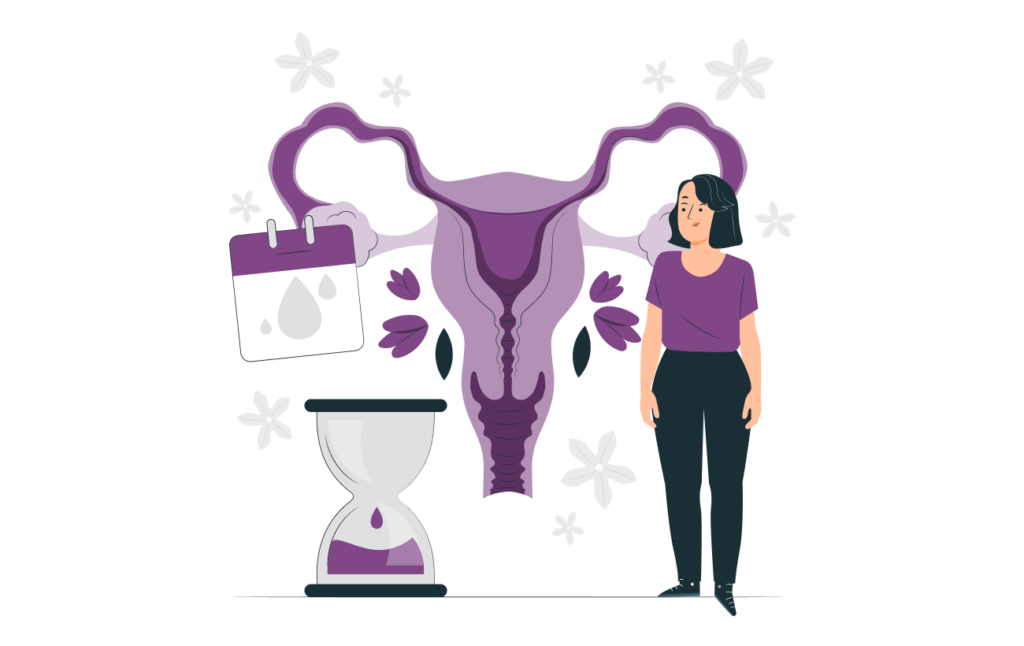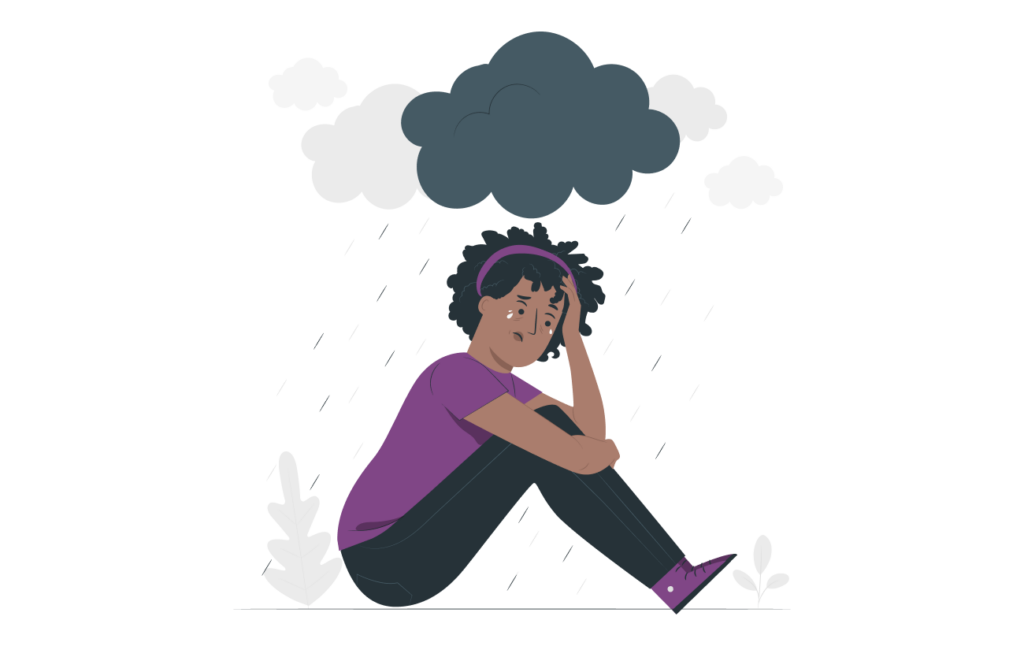Menopause: It’s not like flipping a light switch

For most of us, menopause isn’t like flipping a light switch. It’s a gradual transition that usually starts between ages 45 and 55. That’s when the amount of estrogen and other hormones involved in our reproductive system begin to fluctuate. The transition time is called perimenopause, and it typically lasts about seven years. Once you’ve gone a full year without a period, you’ve reached menopause.
So how can you tell if you’ve started perimenopause? Everyone’s a little bit different. Some people only notice small signs, others have a few symptoms they can manage with lifestyle changes, and some have life-altering symptoms and benefit from support from their provider.
You may be in perimenopause if you notice any of the following.
1. Your menstrual cycle is changing
Some people have shorter cycles than usual, and some have longer. Periods could get lighter or heavier. It’s also common to skip periods. (But if you skip a period and you’re not sure if it’s perimenopause, you may want to take a pregnancy test.).
2. You’ve noticed vaginal dryness and bladder changes

While these changes are more common later in the menopausal transition, the decrease in estrogen can lead to less vaginal moisture, noticeable both in the form of discharge and in the suppleness of skin cells. This often leads to discomfort or pain during sex. These changes can also make vaginal or bladder infections more common. And some people notice increased leaking of urine when they exercise, sneeze, or laugh.
3. You’re getting hot flashes
If your face or body suddenly feel hot or you break out into an unexpected sweat and red blotches, you might be having a hot flash. Hot flashes can vary quite a bit between people and from one time to the next — they can last anywhere from 30 seconds to 10 minutes, and they can range from mild to intense. At night, hot flashes (also called night sweats), may make it hard to sleep well.
4. It’s harder to get a good night’s rest
A lot of things can impact your sleep around perimenopause. Night sweats may keep you up. Some people also experience mood changes, including depression, which can make it hard to sleep. All this is on top of the fact that perimenopause tends to happen at the same time as lots of other life stressors, from caring for aging parents to managing a demanding career and preparing children to leave home. Each of these things can impact sleep — and not getting enough sleep can make managing everything else harder.
5. Your mood is down
Some people struggle with their moods during perimenopause. Mood changes are most common in people with a history of depression or PMS, but they can happen to anyone. It’s not clear whether mood changes are a part of the physical shifts during menopause, or if they come from the stress of life changes and sleep disturbances. Either way, if you have symptoms of depression, or you’re just struggling with your mood, talk to your health care provider about ways to help.
Mood tracking can be a really helpful tool to help you notice patterns and figure out what’s normal for you. It’s always a good idea to keep track of things like crying spells, panic attacks, memory problems, brain fog, or difficulty concentrating.

Many of these symptoms might feel overwhelming (especially when you’re experiencing a few of them at once), but keep in mind that there are actions you can take to minimize their impact on your life. Some symptoms will decrease with time as your body eases out of the perimenopausal transition into post-menopause. For help keeping track of your symptoms, download Ovia and enter how you’re feeling every day. You can share this log with your provider.
6. You’re gaining weight
For some people, the hormonal changes during perimenopause can make it easier to gain weight, especially around the stomach, hips, and thighs. Gaining weight is a normal part of the aging process. It is still very important to focus on eating a healthy, varied diet high in fiber and whole grains as well as getting enough physical activity. While these habits may not change your body size at all, they still contribute greatly to your health status and prevention of certain health conditions.
What about induced menopause?
Some people go directly into menopause without the transition. This happens if the ovaries are surgically removed. It can also be the result of some kinds of chemotherapy, radiation, or medication that triggers menopause to help treat an illness. Unfortunately, this kind of change can make for more significant symptoms than the gradual change of natural menopause. Even if your underlying health condition means you’re not able to take hormones, there are still other medications and treatments that can help decrease your symptoms and improve your quality of life.
When to talk to your provider
Whether you’re going through perimenopause or induced menopause, talk with your provider if changes in your body or mind are bothering you. They should be well-versed in menopause care and able to explain the changes you might be experiencing. Your provider may also make suggestions like lifestyle changes, natural remedies, or prescription medications that could help.
Need to find a provider to speak with about menopause? Try Find-A-Doc.
More resources
If you’re a CDPHP member, you may be eligible for the Ovia app, which makes it easy to track your health indicators and get answers to your menopause questions. You can log how you’re feeling physically and mentally, monitor changes, and keep track of new or ongoing symptoms.
All this information can help you and your provider make sense of patterns and changes so you can explore possible treatments together. And the Ovia Care Team is there every step of the way to answer questions and help you find a local menopause-informed provider to speak with.
*The Ovia Health apps (Ovia and Ovia Parenting) are available at no-cost through the Apple and Android app store. Eligible CDPHP members also have access to premium features such as the Ovia Care Team, which can be accessed selecting that you have Ovia Health as a benefit during signup and entering CDPHP. Learn more about Ovia Health.
Sources
- Mayo Clinic Staff. “Menopause.” Mayo Clinic. Mayo Clinic. October 14, 2020. https://www.mayoclinic.org/diseases-conditions/menopause/symptoms-causes/syc-20353397.
- “Menopause.” Cleveland Clinic. Cleveland Clinic. October 5, 2021. https://my.clevelandclinic.org/health/diseases/21841-menopause.
- “What Is Menopause?” National Institute on Aging. National Institutes of Health (NIH). September 30, 2021. https://www.nia.nih.gov/health/what-menopause.
- Infantino M. “The prevalence and pattern of gastroesophageal reflux symptoms in perimenopausal and menopausal women.” J Am Acad Nurse Pract. 2008. 20(5):266-72. doi: 10.1111/j.1745-7599.2008.00316.x. PMID: 18460167. https://pubmed.ncbi.nlm.nih.gov/18460167/.
- “Menopause and mental health.” Harvard Health Publishing. Harvard Medical School. 2020. https://www.health.harvard.edu/womens-health/menopause-and-mental-health.
- “Can Menopause Cause Anxiety, Depression or Panic Attacks?” Cleveland Clinic. Cleveland Clinic. November 25, 2019. https://health.clevelandclinic.org/is-menopause-causing-your-mood-swings-depression-or-anxiety/.
- Bilodeau. “Sleep, stress, or hormones? Brain fog during perimenopause.” Harvard Health Publishing. Harvard Medical School. 2021. https://www.health.harvard.edu/blog/sleep-stress-or-hormones-brain-fog-during-perimenopause-202104092429.
- “Sleep Problems and Menopause: What Can I Do?” National Institute on Aging. National Institutes of Health (NIH). September 30, 2021. https://www.nia.nih.gov/health/sleep-problems-and-menopause-what-can-i-do.
- “A Good Night’s Sleep.” National Institute on Aging. National Institutes of Health (NIH). November 03, 2020. https://www.nia.nih.gov/health/good-nights-sleep#insomnia.
- Mayo Clinic Staff. “Women’s Health.” Mayo Clinic. Mayo Clinic. March 12, 2021. https://www.mayoclinic.org/healthy-lifestyle/womens-health/in-depth/menopause-weight-gain/art-20046058.
- “Menopause FAQs: Understanding the Symptoms.”The North American Menopause Society. The North American Menopause Society. https://www.menopause.org/for-women/expert-answers-to-frequently-asked-questions-about-menopause/menopause-faqs-understanding-the-symptoms.
 The Daily Dose
The Daily Dose
Comments are closed.